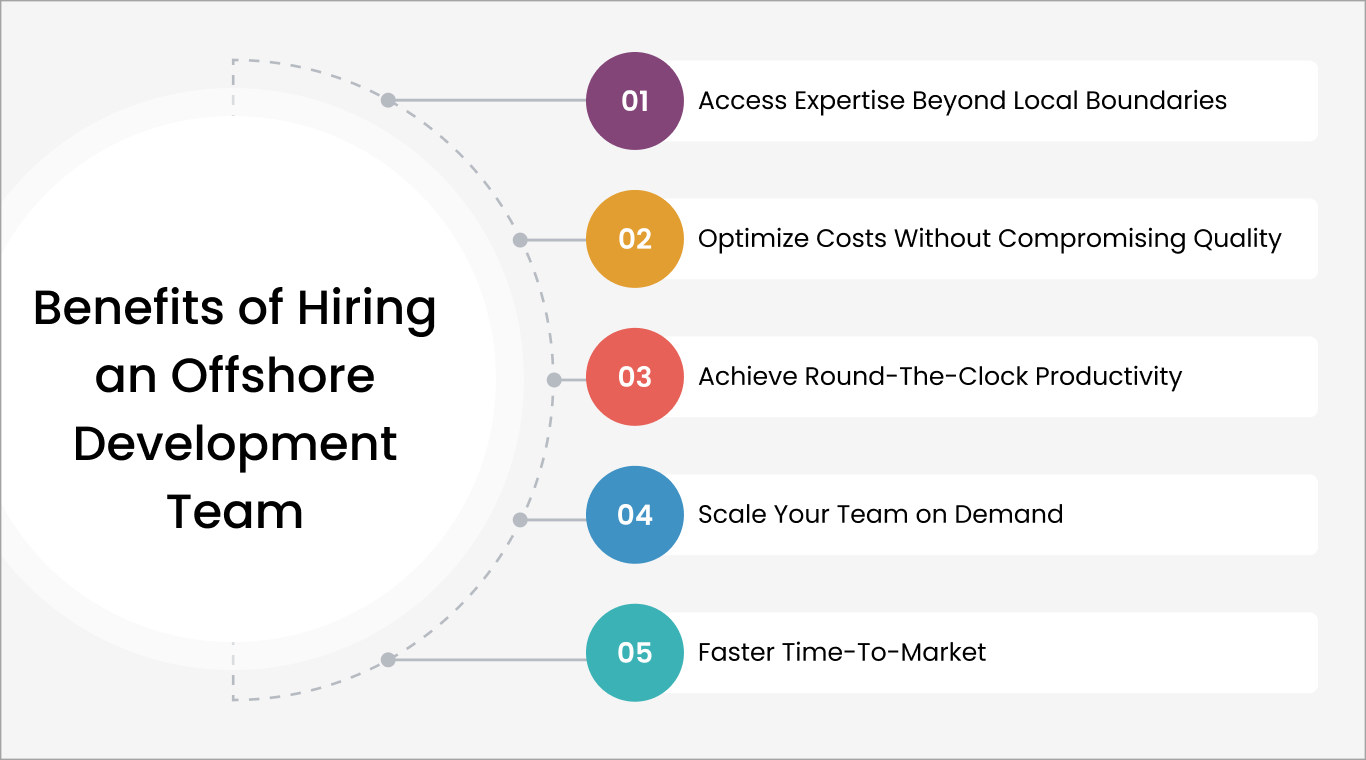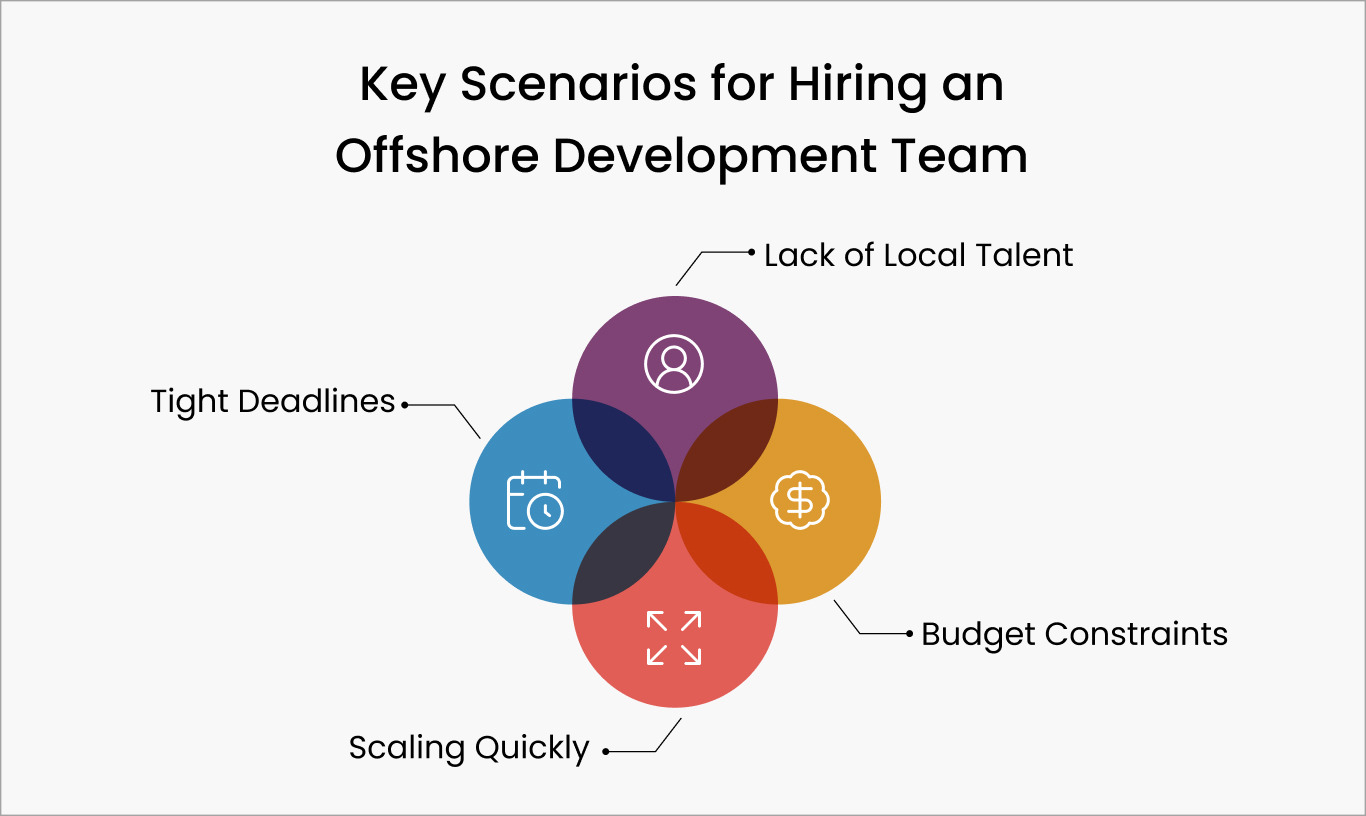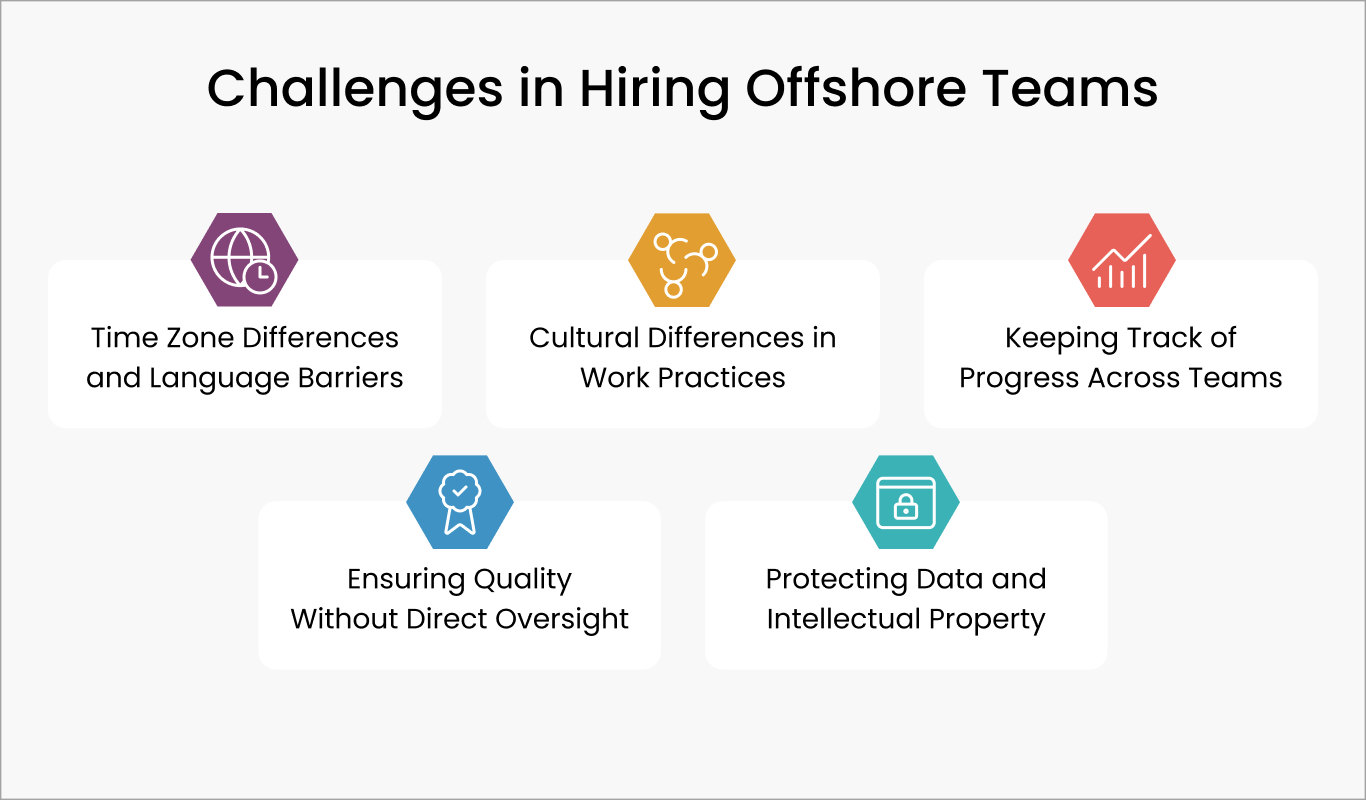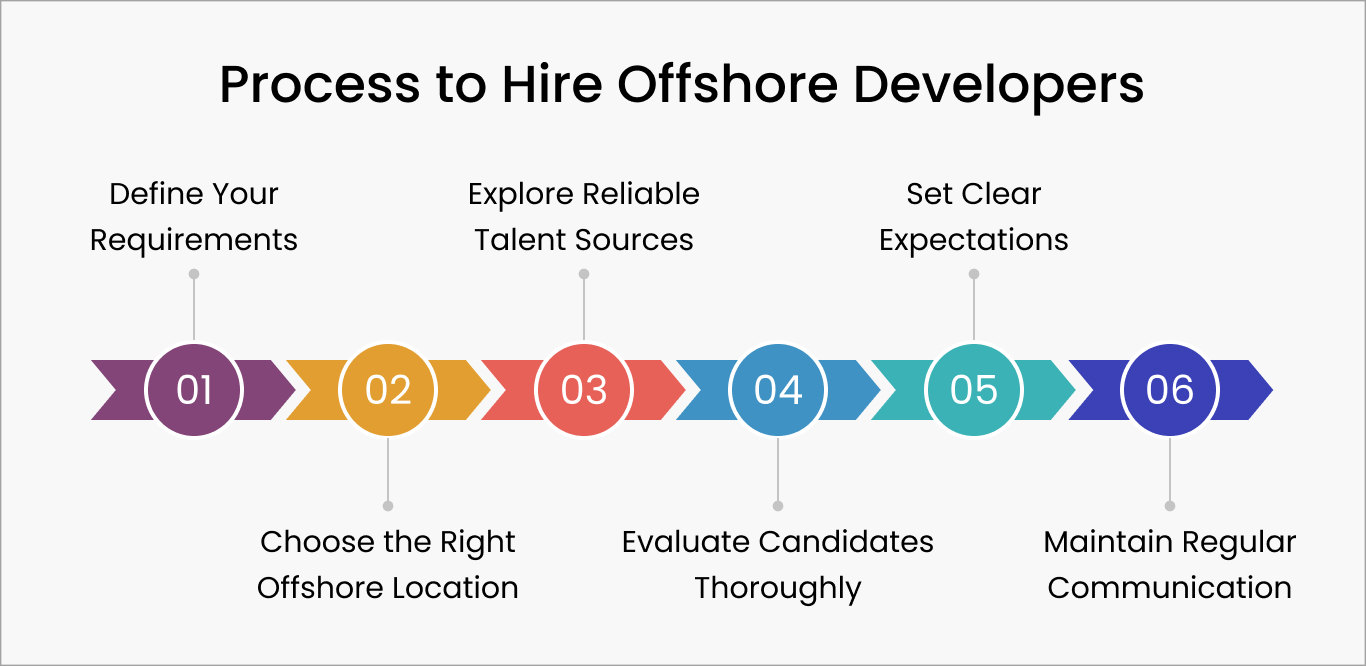Contents
Scaling development teams is no small feat. On one hand, you need top-notch software developers to deliver results fast. On the other, building an in-house team takes time, money, and resources. For many tech companies, this creates a pressing need for a more flexible, efficient solution. Here, hiring an offshore development team offers a uniquely effective approach.
As per Market US, the global offshore software development market size is expected to be worth around USD 389.7 billion by 2033, from USD 120 billion in 2023, growing at a CAGR of 12.5% during the forecast period from 2024 to 2033. This growth highlights the increasing demand and potential of offshore development as a strategic solution for scaling tech teams.
However, hiring offshore developers is not without complexities. Questions naturally arise:
- How do you guarantee their technical expertise?
- How do you address challenges like time zone differences or cultural differences?
- And most critically, how do you find a reliable offshore development company with a proven track record?
This guide offers complete information on how to hire an offshore development team, covering the benefits, challenges, and best practices for building a remote team of high-performing developers. Let’s begin.
What is an Offshore Development Team?
An offshore development team is a group of remote developers based in another, distant country that collaborates with you to execute your software development projects. These teams often include software engineers, QA specialists, designers, and project managers, working with your in-house team or independently to deliver software solutions.
Many businesses partner with offshore software development companies from regions like India or Eastern Europe, known for their vast talent pool and competitive pricing. These teams are particularly helpful for scaling operations, filling technical skill gaps, or reducing development costs while maintaining high-quality work.
By accessing a global talent pool, businesses can accelerate their software development process without the logistical challenges of local hiring. Offshore development services provide flexibility and efficiency and allow companies to focus on their core operations while their development processes are expertly managed.
With a clear understanding of what an offshore development team is and how they operate, let’s explore why partnering with such a team can be a strategic advantage for your business.
Why Hire an Offshore Development Team?

Whether you’re a startup aiming to scale or an enterprise seeking operational flexibility, hiring an offshore development team has become a game-changing strategy. Here’s why:
Access expertise beyond local boundaries
Finding the right talent at the right time can be challenging. Offshore development connects you to a global talent pool, offering access to top-tier professionals from leading tech hubs around the world.
Whether you need AI specialists or full-stack developers in Southeast Asia, you’re no longer constrained by local talent shortages or high competition for niche skills. This ensures your projects receive the expertise they need.
Optimize costs without compromising quality
Hiring an offshore development team is a smart way to save money without compromising on quality. Companies like Space-O Technologies connect businesses with skilled developers from cost-effective regions like India and Eastern Europe, helping them avoid hefty expenses like infrastructure setup, hiring, onboarding, and training.
With an offshore team, you get a ready-to-go crew and avoid the overhead, making it a cost-effective and hassle-free solution for your development needs.
Achieve round-the-clock productivity
Offshore teams operate in different time zones, enabling a follow-the-sun workflow. For example, a U.S.-based company can hand off tasks to a team in India, ensuring projects progress even after the local workday ends. This continuous cycle minimizes bottlenecks, accelerates delivery timelines, and maximizes efficiency, helping you achieve faster results.
Scale your team on demand
Offshore teams provide the flexibility to scale your resources as your business needs evolve. Whether you need additional developers for a product launch or want to downsize during slower periods, offshore development offers scalability without the long-term commitment of permanent hires. This adaptability ensures your business remains agile and responsive to changing demands.
Faster time-to-market
Offshore software developers are accustomed to tight deadlines and diverse projects. With structured workflows and project management tools like Jira and Slack they streamline delivery timelines, helping you achieve faster results.
- Startups testing MVPs quickly, such as launching a mobile app prototype with a remote dev team specializing in app development.
- Enterprises scaling during peak project periods by hiring offshore development teams to handle additional workloads efficiently.
- Businesses looking for specialized technical expertise, like AI developers, which may be scarce locally but readily available through offshore software development companies.
Use Cases
After exploring the key benefits of hiring an offshore development team, let’s dive into specific scenarios and use cases where this approach proves to be a strategic advantage.
When Should You Consider Hiring an Offshore Development Team?

Timing is everything when hiring offshore developers. If you’ve ever wondered whether it’s the right move for your business, here are some situations where offshore development makes perfect sense:
Lack of local talent
You’re trying to find developers with specialized technical skills like AI expertise or mobile app development, but your local talent pool just doesn’t have the right fit. Instead of struggling with endless recruitment processes, hiring offshore developers can bring in the expertise you need. Countries like India are well-known hubs for skilled developers who can step in and deliver.
Budget constraints
Building an in-house team can be expensive. From salaries to infrastructure, the costs add up quickly. Offshore development teams offer a cost-effective alternative. For example, while hiring a U.S.-based software engineer might cost over $100,000 annually, offshore developers from regions like Latin America or Asia can provide the same quality of work for a fraction of the cost, often as low as $20–50 per hour.
Scaling quickly
Your in-house team is doing great, but now you’ve landed a big project, and the workload is piling up. Instead of overwhelming your existing team or waiting weeks (or months) to recruit locally, you can hire an offshore development team to scale operations instantly. Offshore teams are flexible, allowing you to onboard skilled developers who are ready to hit the ground running.
Tight deadlines
Got a launch date looming around the corner? An offshore software development team can be a lifesaver. By leveraging time zone differences, your offshore team can continue working on critical tasks while your in-house team is offline.
This 24-hour development cycle can dramatically reduce project timelines. For example, if your U.S. team finishes a task by evening, your offshore team in Asia can pick it up overnight, ensuring continuous progress.
Scale Your Team with Global Talent Today
Whether you need to scale your team, bridge talent gaps, or fast-track your projects, our experienced professionals deliver tailored solutions to meet your goals.

Now that you know when offshore development makes sense, how does it compare to building an in-house team? Let’s go through some facts in the next section.
In-House Development vs. Offshore Development: A Comparative Analysis
The decision between in-house and offshore development depends on your goals, timeline, and resources. Here’s a quick comparison:
| Key Consideration | In-House Development | Offshore Development |
|---|---|---|
| Cost Efficiency | High overhead costs (salaries, office space, training) | Lower costs due to regional differences |
| Talent Availability | Limited to local talent | Access global expertise in emerging technologies |
| Time-to-Market | Limited by local working hours | 24/7 development cycles |
| Scalability | Lengthy recruitment processes | Flexible engagement models |
| Collaboration Dynamics | Real-time, face-to-face communication | Virtual collaboration via tools like Slack and Zoom |
| Resource Allocation | Long-term commitment to salaries and infrastructure | On-demand resources, reducing overhead costs |
While comparing in-house and offshore development helps you weigh your options, it’s equally important to address the challenges that come with hiring offshore teams.
Let’s explore the challenges of offshore development and practical strategies to overcome these hurdles and ensure a successful collaboration.
Common Challenges in Hiring Offshore Development Teams [With Solutions]

Working with offshore development teams can be incredibly rewarding, but it has its share of challenges. With the right strategies, you can overcome them and build a successful partnership. Let’s look at the common hurdles and how to tackle them effectively.
Time zone differences and language barriers
Collaborating across time zones and dealing with language nuances can lead to delays and misunderstandings. For example, if a U.S. team is working with developers in India, finding overlapping hours and interpreting subtle communication cues can be tough.
- Create a communication strategy that accommodates everyone.
- Schedule daily stand-ups during overlapping hours to align priorities.
- Use tools like Slack for quick updates, Jira for detailed task management, and Loom for recorded instructions to minimize miscommunication.
How to tackle it:
Cultural differences in work practices
Cultural norms around communication, hierarchy, and work styles can sometimes cause friction. For instance, in some cultures, team members might avoid direct confrontation, leaving concerns unspoken and unresolved.
- Foster a feedback-friendly environment where team members feel comfortable sharing their concerns.
- Provide cross-cultural training to improve understanding and collaboration.
- Use tools like Miro or Confluence for collaborative brainstorming and shared alignment.
How to tackle it:
Keeping track of progress across teams
Time zone differences might mean progress slows down when urgent responses are needed. Plus, managing tasks across a remote team can feel overwhelming without the right tools.
- Implement a “follow-the-sun” workflow where tasks are handed off during overlapping hours.
- Use tools like Notion to organize tasks and track progress and Loom for asynchronous video updates to keep everyone on the same page.
How to tackle it:
Ensuring quality without direct oversight
When teams are remote, maintaining high standards can be a challenge. Without regular check-ins, issues like delayed reviews or unclear expectations can creep in.
- Schedule weekly code reviews using platforms like GitHub to monitor progress and catch issues early.
- Define clear KPIs for quality, such as meeting deadlines, minimizing errors, and ensuring user acceptance testing success.
- Regularly review these metrics to ensure alignment and consistent performance.
How to tackle it:
Protecting data and intellectual property
Sharing sensitive data with an offshore team can feel risky, especially if you’re concerned about unauthorized access or breaches.
- Partner with ISO-certified teams like Space-O Technologies that prioritize security.
- Use encrypted storage solutions and tools for secure password sharing.
- Establish NDAs and IP ownership agreements, and conduct regular security audits to safeguard your assets.
How to tackle it:
Collaborate with Experienced Professionals to Handle Complex Projects
From tackling tight deadlines to delivering smart, scalable solutions, we’ll work with you every step of the development path.
What are the Different Offshore Development Team Models
Here’s a breakdown of the three most common offshore development team models to help you determine which one aligns with your needs:
Dedicated teams
If you’re looking to hire a dedicated development team, these experts work exclusively on your project, providing consistent support and deeper integration with your business goals. They operate as an extension of your in-house team and are involved in long-term projects or ongoing development needs.
- Businesses with ongoing development projects or product roadmaps.
- Companies that are looking for consistent support and deeper integration with their existing teams.
- Scenarios requiring significant customization, long-term planning, or specialized skills.
Best for
- Complete control over the team’s workflows, priorities, and processes.
- Deep collaboration with a team fully immersed in your business goals.
- Cost-effective for long-term projects compared to building an in-house team.
Advantages
Who should choose this model
If you’re planning a large-scale, multi-phase product development or need ongoing enhancements and support, hiring a dedicated development team is your ideal choice.
Also Read: Complete Guide on Hiring a Dedicated Development Team
Extended teams
An extended team model supplements your in-house team with offshore developers who fill specific skill gaps or provide additional capacity. Unlike a dedicated team, they collaborate closely with your internal team but are typically managed by your in-house leadership.
- Companies with an in-house development team that needs additional support for specific tasks or projects.
- Short-to-medium-term projects requiring niche expertise or increased capacity.
Best for
- Flexibility to scale your team based on workload fluctuations.
- Access to specialized expertise without the long-term commitment of permanent hires.
- Seamless integration with your in-house team, offering consistent workflows.
Advantages
Who should choose this model
If you already have an in-house team but need to boost capacity or expertise temporarily, the extended team model is perfect for you.
Project-based outsourcing
In this model, you outsource the entire project to an offshore team, including planning, development, and delivery. The offshore partner takes full ownership of the project, managing resources, timelines, and deliverables.
- One-off projects with clearly defined requirements and deliverables.
- Businesses that don’t have in-house development resources or want to focus on their core operations.
Best for
- Minimizes the need for hands-on management, freeing you to focus on other priorities.
- Clear cost structure based on project scope, reducing budget unpredictability.
- Ideal for fixed timelines and deliverables.
Advantages
Who should choose this model
Project-based outsourcing is an efficient and hassle-free option if you have a clearly defined project with specific goals and deadlines.
Tip:
When exploring offshore models like dedicated teams or project-based outsourcing, researching offshore software development companies can also help you identify the best fit for your business.
Now that you’ve got a good idea of the different offshore development team models, the next step is figuring out how to hire the right developers for your project. Let’s walk you through the process step by step.
How to Hire Offshore Developers: A Step-by-Step Guide

Hiring an offshore development team can seem daunting, but with the right approach, it’s a straightforward and rewarding process. Here’s the step-by-step process to help you find and onboard the perfect offshore developers for your project:
Define your requirements
Start by defining the scope of your project. For instance, if you’re building a mobile app, you might need expertise in Swift for iOS or Kotlin for Android. For a web-based solution, look for developers skilled in JavaScript frameworks like React or Angular.
Outline the functionalities, design needs, and integrations required to ensure alignment with your goals. Do you need expertise in specific programming languages or tools? Determine whether you need a full-fledged development team or just a few specialists.Choose the right offshore location
Not all offshore destinations are created equal. Research countries that specialize in the services you need. Consider factors like time zone (for smooth communication), cultural compatibility (to avoid misunderstandings), language proficiency (especially in English), and cost-effectiveness.
For example, Asia offers competitive pricing with skilled developers, making it a popular choice for startups and small businesses.Explore reliable talent sources
Leverage trusted platforms and agencies to find offshore developers. Some popular options include:
- Dedicated Development Agencies: These agencies specialize in providing pre-vetted offshore development teams. They offer a structured approach, with resources that have already been assessed for skills and experience. Working with an agency like Space-O Technologies ensures accountability and ongoing support, making it ideal for businesses seeking long-term partnerships or full-cycle development solutions.
- Freelance Platforms: Websites like Upwork, Toptal, and Fiverr give you access to a wide pool of freelance developers. You can review their portfolios, check client feedback, and engage them for short-term or specialized tasks. However, managing freelancers directly may require more effort in terms of communication and quality assurance.
- Tech Communities and Forums: Platforms like GitHub, Stack Overflow, and LinkedIn are goldmines for finding skilled developers. These communities allow you to see a developer’s actual work, participation in discussions, and endorsements from peers, helping you gauge their expertise and problem-solving capabilities.
- Referrals and Recommendations: Sometimes, the best talent comes through word-of-mouth. Reach out to your professional network or industry contacts to find agencies or developers they’ve worked with and trust.
Evaluate candidates thoroughly
Screen candidates based on their portfolios, client reviews, and technical expertise. When reviewing portfolios, look for completed projects similar to your requirements and examine the quality of their code, design, or functionality. For technical tests, consider using platforms like HackerRank or CodeSignal to create scenario-based tasks that mimic real project challenges, helping you gauge their practical problem-solving skills. Conduct interviews and technical tests to assess their problem-solving abilities and knowledge.
Set clear expectations
Once you’ve chosen your team, establish clear expectations regarding deliverables, deadlines, and communication channels. Use project management tools like Jira, Trello, or Asana to keep everything organized.
Maintain regular communication
Effective collaboration hinges on consistent and transparent communication. For example, establish a schedule for regular check-ins to ensure alignment, use tools like Slack or Microsoft Teams for instant communication, and document key decisions on platforms like Confluence or Google Drive.
Encourage open feedback channels to address issues promptly and maintain a shared project timeline to track progress effectively. Schedule regular check-ins, use collaboration tools like Slack or Zoom, and ensure everyone is aligned on the project goals.
If you’re exploring broader options for selecting a company, you can check out this guide on how to hire a software development company for additional insights.
How Much Does it Cost to Hire Offshore Developers?
The cost of hiring offshore developers depends on several factors, including the location, expertise level, and project complexity. Here’s a breakdown to help you estimate your budget:
| Category-wise costs | Details | Cost Range |
|---|---|---|
| Location-Based | Asia (India, Philippines) | $20–$40/hour |
| Eastern Europe (Poland, Ukraine) | $30–$60/hour | |
| Latin America (Brazil, Argentina) | $35–$70/hour | |
| Skill Level | Junior Developers | $15–$35/hour |
| Mid-Level Developers | $30–$60/hour | |
| Senior Developers | $60–$100/hour | |
| Project Complexity | Simple Applications | $5,000–$10,000 |
| Medium-Complexity Projects | $15,000–$50,000 | |
| High-Complexity Solutions | $50,000+ |
For a detailed analysis, you can also explore this comprehensive guide on the cost of hiring a software developer.
Disclaimer: These costs are approximate and can vary depending on your specific project requirements, technology stack, and desired outcomes. For accurate pricing, consult with a trusted offshore development partner.
Hire Skilled Offshore Developers from Space-O Technologies
Hiring and retaining skilled developers can be challenging. Especially when local talent is scarce, budgets are tight, and timelines are looming. However, it doesn’t have to be.
At Space-O Technologies, we make it simple to hire skilled offshore developers who deliver high-quality results without the hassle. With 14+ years in the industry and a portfolio of over 300 software solutions, we’ve successfully delivered projects across 30+ industries. Our team of 140+ certified experts, including developers, QA testers, and project managers, ensures every project is in the best hands.
- Customize team sizes and working hours to fit your unique requirements.
- Teams operate in sync with your time zone for smooth collaboration.
- Easily scale teams up or down to adapt to project demands, ensuring efficient resource allocation and cost optimization.
- Access top-notch talent at competitive rates to reduce project costs without compromising quality.
- Agile methodologies help speed up development timelines, ensuring faster product launches.
Highlights:
Space O-Technologies has 4.8+ Clutch, and 4.9+ GoodFirms ratings speak for themselves. Clients love our commitment to quality and successful project delivery.
Our experts ensure your applications remain functional, secure, and up-to-date no matter where you are. Contact us to discuss your requirements for hiring offshore developers.
Frequently Asked Questions on Hiring Offshore Developers
What’s the timeline to onboard an offshore developers?
Onboarding can vary depending on the scope and complexity of your project. Typically, it takes 1-3 weeks to finalize contracts, align team expectations, and integrate offshore developers into your workflows.
What qualifications should be required for an offshore development team?
When selecting an offshore development team, particularly from Space-O Technologies, an offshore team should have technical expertise in relevant programming languages, strong project management skills (e.g., Agile), effective communication, post-deployment support, and a good cultural fit for smooth collaboration.
What are the best locations to hire offshore developers?
Some of the top locations for hiring offshore developers include India, Eastern Europe (e.g., Poland, Ukraine), and Latin America (e.g., Brazil, Argentina). These regions offer a combination of skilled talent, competitive pricing, and strong expertise in various technologies.
Can offshore developers handle large-scale projects remotely?
Yes, offshore developers are well-equipped to handle large-scale projects remotely. With communication and project management tools, combined with agile methodologies, offshore teams can efficiently manage complex projects and deliver high-quality results.



